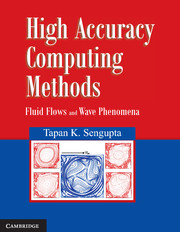Book contents
- Frontmatter
- Contents
- Foreward
- Preface
- Chapter 1 Basic Ideas of Scientific Computing
- Chapter 2 Governing Equations in Fluid Mechanics
- Chapter 3 Classification of Quasi-Linear Partial Differential Equations
- Chapter 4 Waves and Space–Time Dependence in Computing
- Chapter 5 Spatial and Temporal Discretizations of Partial Differential Equations
- Chapter 6 Solution Methods for Parabolic Partial Differential Equations
- Chapter 7 Solution Methods for Elliptic Partial Differential Equations
- Chapter 8 Solution of Hyperbolic PDEs: Signal and Error Propagation
- Chapter 9 Curvilinear Coordinate and Grid Generation
- Chapter 10 Spectral Analysis of Numerical Schemes and Aliasing Error
- Chapter 11 Higher Accuracy Methods
- Chapter 12 Introduction to Finite Volume and Finite Element Methods
- Chapter 13 Solution of Navier–Stokes Equation
- Chapter 14 Recent Developments in Discrete Finite Difference Computing
- Exercises
- References
- Index
Chapter 14 - Recent Developments in Discrete Finite Difference Computing
Published online by Cambridge University Press: 05 January 2014
- Frontmatter
- Contents
- Foreward
- Preface
- Chapter 1 Basic Ideas of Scientific Computing
- Chapter 2 Governing Equations in Fluid Mechanics
- Chapter 3 Classification of Quasi-Linear Partial Differential Equations
- Chapter 4 Waves and Space–Time Dependence in Computing
- Chapter 5 Spatial and Temporal Discretizations of Partial Differential Equations
- Chapter 6 Solution Methods for Parabolic Partial Differential Equations
- Chapter 7 Solution Methods for Elliptic Partial Differential Equations
- Chapter 8 Solution of Hyperbolic PDEs: Signal and Error Propagation
- Chapter 9 Curvilinear Coordinate and Grid Generation
- Chapter 10 Spectral Analysis of Numerical Schemes and Aliasing Error
- Chapter 11 Higher Accuracy Methods
- Chapter 12 Introduction to Finite Volume and Finite Element Methods
- Chapter 13 Solution of Navier–Stokes Equation
- Chapter 14 Recent Developments in Discrete Finite Difference Computing
- Exercises
- References
- Index
Summary
Introduction
We have discussed classical developments, as well as, recent higher accuracy computing methods so far. We have compared various discrete computing methods with the same framework of spectral analysis. In this chapter, we include topics of more recent origin, which have bearing with the central theme of high accuracy computing of flows and wave phenomena.
In Sections 4.7–4.10, we have discussed about length- and time-scales excited in flows from the perspective of waves as building blocks. While future computational activities would be predominantly for DNS, there are many issues to be sorted out. For DNS, error must be the major concern. In Chapters 8–11, we have identified various sources of error with the help of developed error dynamics in Eqn. (8.31) for convection dominated problems. These sources of error are due to numerical stability, phase and dispersion errors. In subsequent chapters, we have added to this list by considering spurious upstream propagating waves (q-waves), the Gibbs' phenomenon, aliasing error etc. We also discuss about better time discretization methods developed with DRP analysis of Chapter 8. This helps solving space–time dependent problems by optimized time integration method which reduces error. This has been presented for high accuracy two-time level, multi-stage Runge–Kutta methods.
- Type
- Chapter
- Information
- High Accuracy Computing MethodsFluid Flows and Wave Phenomena, pp. 442 - 534Publisher: Cambridge University PressPrint publication year: 2013



